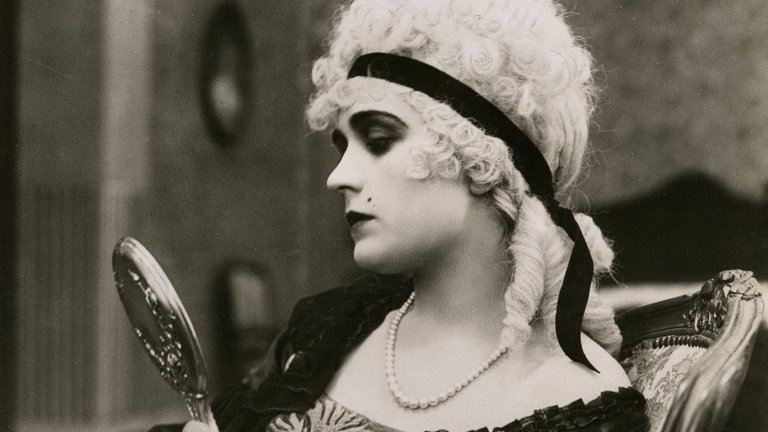Film Review: Madame DuBarry (Passion, 1919)

Ernst Lubitsch enjoys reputation of one of the most legendary directors of Classic Hollywood, mainly built on his sophisticated comedies made in style known as “Lubitsch touch”. Like so many Classic Hollywood legends, he began career outside Hollywood, in his native Germany during silent era. There he already created reputation both on comedies and prestigious historic dramas. One of the latter was 1919 epic Madame DuBarry, a big international hit that would be known under English title Passion, and would help trigger post-WW1 boom of German cinema during Weimar period.
The protagonist, played by Pola Negri, is Jeanne Bécu, 18th Century woman whose melodramatic life story about meteoric rise and tragic fall in pre-revolutionary France has inspired many film makers before and afterwards. The plot begins when Jeanne, who was born in commoners’ family, works in clothing shop owned by tyrannical Madame Labille (played by Marga Köhler) and has started romantic relationship with poor student Armand La Foix (played by Harry Liedtke). Beautiful and coquettish, Jeanne doesn’t have problems catching attention of rich and influential men, like Spanish ambassador Don Diego (played by Magnus Stifter) and, later, Count Guillaume Du Barry (played by Karl Platen), who takes her as his mistress. Count is heavily in debt and wants the government to bail him out, so he sends Jeanne to palace where she should charm King’s first minister Duke of Choiseul (played by Rheinhold Schünzel). He doesn’t take the bait, but Jeanne is noticed by King Louis XV (played by Emil Jannings) who takes her as his mistress. It is welcome development for Count DuBarry who even arranges his brother Count Jean Du Barry (played by Eduard von Winterstein) to marry Jeanne in order to provide her with noble title and thus give formal basis for presence at royal court. Jeanne soon becomes most powerful woman in France and uses her influence to save her former lover Armand, who has been sentenced to death for killing Don Diego in duel. Armand is not only pardoned, but also made officer in Royal Guard, but the relationships between lovers become increasingly sour, especially when Armand begins to see huge chasm between privileged life of decadent aristocracy and everyday struggle between lower classes to him he belonged. Jeanne’s life comes crashing down after Louis XV dies of smallpox and she gets exiled from the court. Many years later, embittered Armand has joined the ranks of revolutionaries and takes part in the tribunal that sends despised aristocrats and prominent figures of the old regime, including Jeanne, to the guillotine.
Few months before the start of the production of Madame DuBarry, Germany has suffered catastrophic defeat in war and revolution and was still suffering economic blockade, hunger and political violence. But you couldn’t tell that based on what you could see on screen. Lubitsch’s film looks very slick, stylish and provides same sort of spectacle you could have expected from big budget Hollywood films of its age. This, on one hand, isn’t very surprising because First World War, paradoxically, had beneficial effect on German film industry. By getting rid of Allied countries’ competition on domestic markets and being centralised by government for propaganda purposes, it gained major resource in form of UFA, film studio that would become one of the most respected institutions of world cinema in interwar years. Its resources are put on display in Madame DuBarry, especially in latter scenes that reconstruct streets of 18th Century Paris and most iconic episodes of French Revolution in a manner more efficient that David W. Griffith in Orphans of the Storm few years later. It is in the early scenes, that take mostly take place in interiors, that show film’s age and Lubitsch’s relative lack of experience. He uses mostly middle shots and avoids close ups, while camera remains static. Polish actress Pola Negri, with whom Lubitsch worked before and afterwards, uses too much make up and her acting style is overly theatrical. However, Lubitsch make some of those scenes interesting with occasional light-hearted detail that, among other things, includes one of the rare depictions of foot fetish. Light tone from the beginning is replaced by increasingly dark tone near the end that includes plenty of violence and brutal execution scene. The latter is often interpreted as reflection of contemporary real events on the script, which apparently found parallels between revolutions in France and Germany. Despite that, Madame DuBarry became big hit not only in Germany, but worldwide and caught attention of Hollywood producers who in 1920s took on emerging threat of German cinema by simply importing its talent. That included Pola Negri, that became great vampish icon of silent era Hollywood and Lubitsch who would have even greater successes in the sound era.
RATING: 6/10 (++)
Blog in Croatian https://draxblog.com
Blog in English https://draxreview.wordpress.com/
InLeo blog https://inleo.io/@drax.leo
InLeo: https://inleo.io/signup?referral=drax.leo
Unstoppable Domains: https://unstoppabledomains.com/?ref=3fc23fc42c1b417
Hiveonboard: https://hiveonboard.com?ref=drax y
Bitcoin Lightning HIVE donations: https://v4v.app/v1/lnurlp/qrcode/drax
Rising Star game: https://www.risingstargame.com?referrer=drax
1Inch: https://1inch.exchange/#/r/0x83823d8CCB74F828148258BB4457642124b1328e
BTC donations: 1EWxiMiP6iiG9rger3NuUSd6HByaxQWafG
ETH donations: 0xB305F144323b99e6f8b1d66f5D7DE78B498C32A7
Posted using CineTV
!LUV
!COFFEE